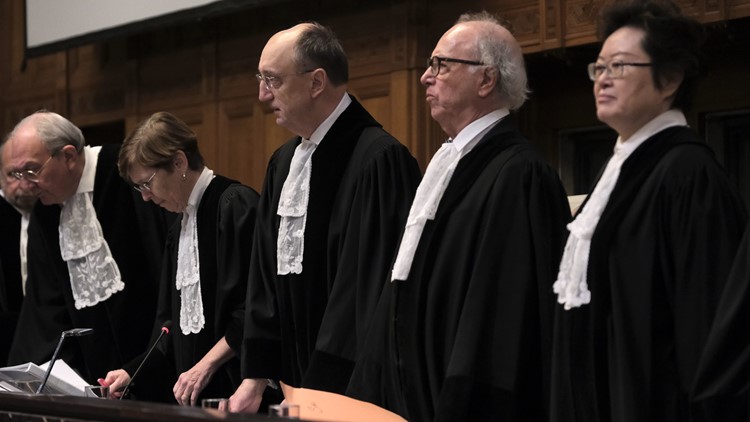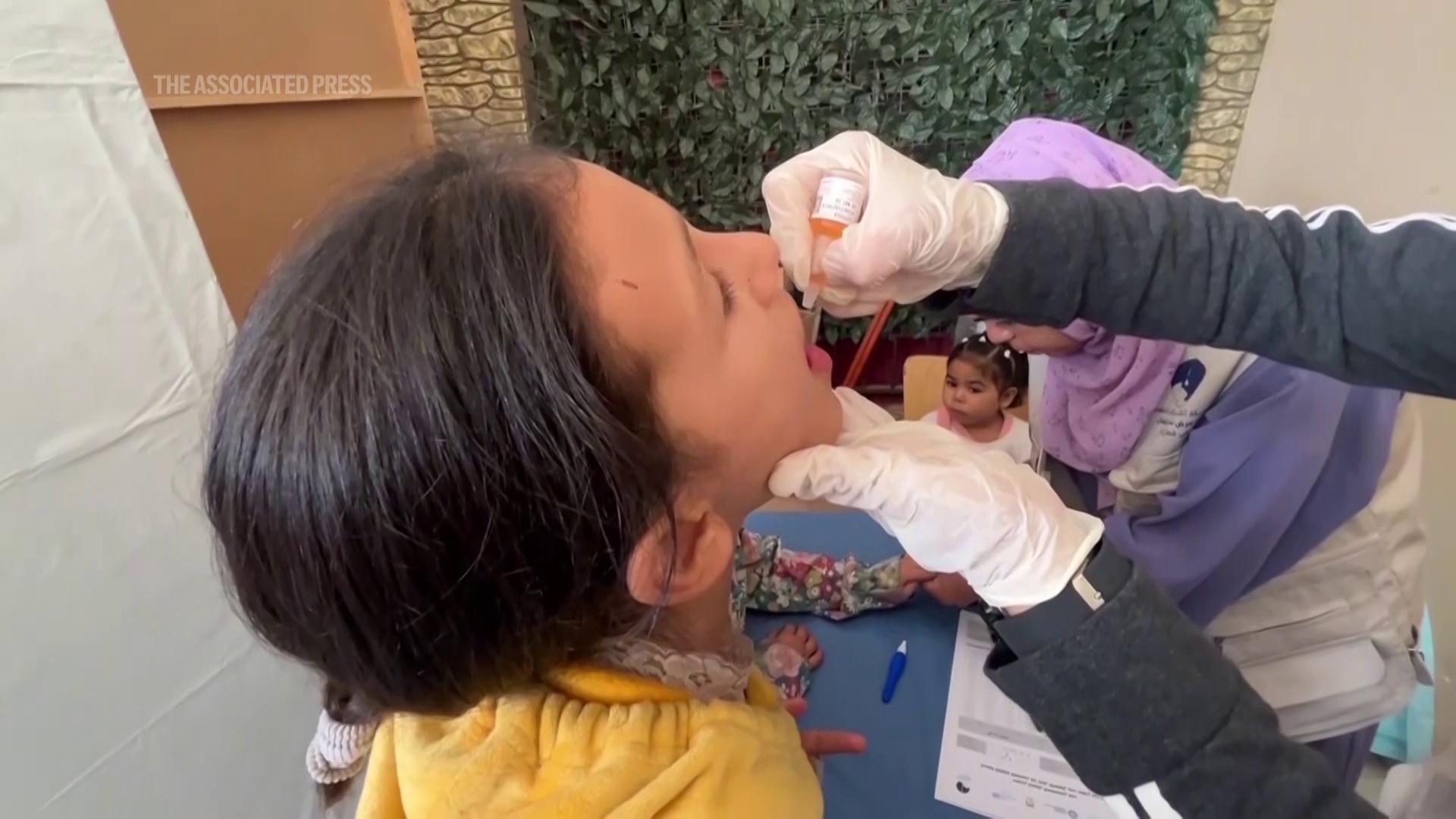CAPE TOWN, South Africa — South Africa says more than 50 countries have expressed support for its case at the United Nations' top court accusing Israel of genocide against Palestinians in the war in Gaza.
Others, including the United States, have strongly rejected South Africa's allegation that Israel is violating the U.N. Convention on the Prevention and Punishment of the Crime of Genocide. Many more have remained silent.
The world's reaction to the landmark case that was heard Thursday and Friday at the International Court of Justice in The Hague shows a predictable global split when it comes to the inextricable, 75-year-old problem of Israel and the Palestinians. Sunday marks 100 days of their bloodiest ever conflict.
The majority of countries backing South Africa's case are from the Arab world and Africa. In Europe, only the Muslim nation of Turkey has publicly stated its support.
No Western country has declared support for South Africa's allegations against Israel. The U.S., a close Israel ally, has rejected them as unfounded, the U.K. has called them unjustified, and Germany said it "explicitly rejects" them.
China and Russia have said little about one of the most momentous cases to come before an international court. The European Union also hasn't commented.
US: ‘MERITLESS’ ALLEGATIONS
U.S. Secretary of State Antony Blinken said on a visit to Israel a day before the court proceedings began that South Africa's allegations are “meritless" and that the case “distracts the world” from efforts to find a lasting solution to the conflict. National Security Council spokesman John Kirby said genocide is “not a word that ought to be thrown around lightly, and we certainly don’t believe that it applies here.”
“We don’t agree with what the South Africans are doing,” U.K. Foreign Minister David Cameron said of the case.
Israel fiercely rejects the allegations of genocide and says it is defending its people. It says the offensive is aimed at eradicating the leaders of Hamas, the militant group that runs the territory and provoked the conflict by launching surprise attacks on southern Israel on Oct. 7, killing some 1,200 people, mainly civilians, and taking around 250 hostages.
Blinken said a genocide case against Israel was “particularly galling” given that Hamas and other groups “continue to openly call for the annihilation of Israel and the mass murder of Jews.”
The U.S., the U.K., the EU and others classify Hamas as a terrorist organization.
Israel's military response in Gaza has killed more than 23,000 Palestinians, according to Gaza's Health Ministry. The count doesn't distinguish between combatants and civilians. It says more than two-thirds of the dead are women and children. Much of northern Gaza has become an uninhabitable moonscape with entire neighborhoods erased by Israeli air strikes and tank fire.
South Africa has also condemned Hamas' Oct. 7 attack but argues that it did not justify Israel's response.
GERMAN SUPPORT FOR ISRAEL
Germany's announcement of support for Israel on Friday, the day the hearings closed, has symbolic significance given its history of the Holocaust, when the Nazis killed 6 million Jews in Europe. Israel was created after World War II as a haven for Jews in the shadow of those atrocities.
“Israel has been defending itself," German government spokesperson Steffen Hebestreit said. His statement also invoked the Holocaust, which in large part spurred the creation of the U.N. Genocide Convention in 1948.
"In view of Germany’s history ... the Federal Government sees itself as particularly committed to the Convention against Genocide," he said. He called the allegations against Israel “completely unfounded.”
Germany said it intends to intervene in the case on Israel's behalf.
The EU has only said that countries have a right to bring cases to the U.N. court. Most of its member states have refrained from taking a position.
Turkey, which is in the process of joining the EU, was a lone voice in the region. Turkish President Recep Tayyip Erdogan said his country provided documents that were being used against Israel in the case.
“With these documents, Israel will be condemned,” he said.
ARAB CONDEMNATION
The Organization of Islamic Cooperation was one of the first blocs to publicly back the case when South Africa filed it late last month. It said there was “mass genocide being perpetrated by the Israeli defense forces” and accused Israel of “indiscriminate targeting” of Gaza's civilian population.
The OIC is a bloc of 57 countries that includes Iran, Iraq, Saudi Arabia, Qatar and Egypt. Its headquarters are in Saudi Arabia. The Cairo-based Arab League, whose 22 member countries are almost all part of the OIC, also backed South Africa's case.
South Africa drew some support from outside the Arab world. Namibia and Pakistan agreed with the case at a U.N. General Assembly session this week. Malaysia also expressed support.
“No peace-loving human being can ignore the carnage waged against Palestinians in Gaza,” Namibian President Hage Geingob was quoted as saying in the southern African nation's The Namibian newspaper.
Malaysia's Foreign Ministry demanded “legal accountability for Israel’s atrocities in Gaza.”
CHINA AND RUSSIA: SILENCE
China, Russia — which is also facing allegations of genocide in the world court — and the emerging power of India have largely remained silent, seemingly aware that taking a stand in such an inflammatory case has little upside and could irreversibly upset their relationships in the region.
India’s foreign policy has historically supported the Palestinian cause, but Prime Minister Narendra Modi was one of the first global leaders to express solidarity with Israel and call the Hamas attack terrorism.
SOMEWHERE IN THE MIDDLE
A handful of South American countries have spoken up, including the continent's biggest economy, Brazil, whose Foreign Ministry said President Luiz Inácio Lula da Silva backed South Africa's case. However, the ministry's comments did not directly accuse Israel of genocide but focused on the need for a cease-fire in Gaza.
South Africa's case against Israel is two-fold: It wants the court to say Israel is committing genocide and to issue an interim ruling ordering an end to its military campaign in Gaza. The court said it would decide on an interim ruling soon but, reflecting the gravity of the case, it could take years for a final verdict on the genocide charge.
Brazil said it hoped the case would get Israel to “immediately cease all acts and measures that could constitute genocide."
Other countries have stopped short of agreeing with South Africa. Ireland premier Leo Varadkar said the genocide case was “far from clear cut” but that he hoped the court would order a cease-fire in Gaza.
Israeli Prime Minister Benjamin Netanyahu said no one — including the world court — will stop Israel's war against Hamas. Russia didn't obey the court when it told it to halt its invasion of Ukraine nearly two years ago.



